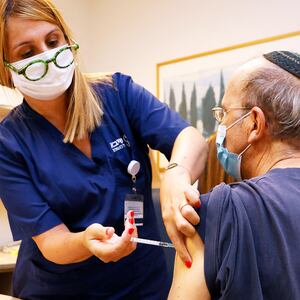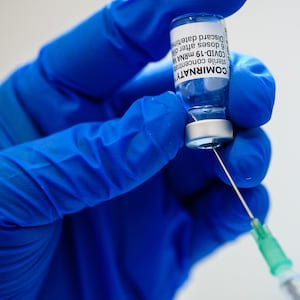Millions of Israelis rushed to pharmacies and clinics for their third dose of COVID vaccine after the country’s health regulators authorized boosters back in July, and the apparent result—four months on—is striking.
For the roughly 4 million Israelis who’ve gotten boosted—that’s two-thirds of the adult population—COVID cases seem to have plummeted. A third dose of Pfizer’s messenger-RNA vaccine has reduced infections tenfold, according to the preprint of a new study that appeared online on Oct. 7. The study is not yet peer-reviewed.
Welcome to Rabbit Hole, where we dive deep on the biggest story. It’s for Beast Inside members only. Join up today.
ADVERTISEMENT
The Israeli booster push is a possible success story, and a model for countries that can get access to adequate supplies of vaccine for population-wide booster rollouts, experts told The Daily Beast. Israel’s experience might also cast into relief U.S. authorities’ own hesitancy when it comes to boosters.
Despite the United States sitting on a huge stockpile of unused vaccines, the U.S. Food and Drug Administration and Centers for Disease Control and Prevention have authorized boosters for just a relatively small portion of the adult population.
Other countries should copy Israel, not the U.S., Ali Mokdad, a professor of health metrics sciences at the University of Washington Institute for Health, told The Daily Beast. “The science is clear and there is a need for a booster.”

Israeli Prime Minister Naftali Bennett receives a booster shot on Aug. 20.
Jack Guez/AFP via GettyBut for a lot of countries, that might not be possible anytime soon owing to a shortage of doses. “Even considering a booster strategy is a luxury that most countries will not enjoy this year,” Andrea Taylor, a Duke University public health expert, told The Daily Beast.
Most experts always expected that, once COVID vaccines were available, boosters would inevitably follow. As a respiratory disease, COVID shares some qualities in common with the flu. Including, it turns out, vaccine strategy. The flu virus evolves quickly, so the effectiveness of a flu vaccine declines fast. That’s why we get a fresh flu jab every fall.
Likewise, the effectiveness of the leading COVID vaccines declines over time as mutations of the basic SARS-CoV-2 pathogen produces new and more aggressive variants. A third shot helps our immune systems fight back.
“The booster cranks up the amount of antibodies circulating in the blood, and available to respond to invading virus, in advance,” Eric Bortz, a University of Alaska-Anchorage virologist and public health expert, told The Daily Beast. “Against a fast-moving variant like Delta, this immediate antibody response can limit severity of ‘vaccine breakthrough’ infections.”
Israel was the first country to authorize a booster for the Pfizer COVID vaccine. As a small, fairly well-off country with a well-developed public-health apparatus, Israel had vaccinated its population faster than almost any other country by this summer. But as the summer wore on and new variants—in particular, the deadly Delta variant—became dominant, the benefits of widespread prime vaccination started to wane.
In late July, Prime Minister Naftali Bennett authorized boosters for anyone over the age of 60, five months after their initial two-dose regimen. A month later, authorities expanded booster eligibility to anyone over 40 as well as frontline workers. A week later, they cleared anyone over the age of 12. In other words, anyone who was also authorized for the prime doses.
And on Oct. 3, the Israeli government went even farther, and required a third dose in order for someone to be considered “fully” vaccinated, a prerequisite for obtaining a vaccine passport that gives the holder unrestricted access to businesses, events, and travel.
Widespread boosting kicked COVID’s ass in Israel, according to the October study. The study’s Israeli authors scrutinized government data from July to October, comparing COVID infection rates in the boosted population against rates in the non-boosted population.

A woman presents a vaccination book with three doses of COVID19 vaccine recorded at Sheba Medical Center on July 14, 2021 in Ramat Gan, Israel.
Amir Levy/Getty ImagesThe numbers speak for themselves. “Confirmed infection rates were ~10-fold lower in the booster versus non-booster group,” the authors wrote. The benefit was even greater for older Israels. Infections dropped by a factor of 19 for people over 60, and by a factor of 22 for the 40-60 age group.
There are implications for authorities in other countries—assuming the study holds up to peer review, of course. If and when a country has enough vaccine supply to add a third dose of Pfizer on top of the prime doses, it should, if the study is reliable.
And don’t get caught in the weeds like the Americans did. The FDA on Aug. 12 granted emergency-use authorization to Pfizer and Moderna to offer third doses of their respective mRNA vaccines to the roughly 7 million Americans with immune disorders, eight months after their second doses.
A month later, a key FDA panel endorsed a booster for Americans 65 and older plus younger people who are at high risk of disease owing to underlying conditions—but only if they got the Pfizer prime jabs. But the same panel, citing a lack of extensive data on booster effectiveness for younger people, came out against a universal third shot for the Pfizer vaccine. A CDC panel voted the same way.
CDC director Rochelle Walensky ultimately overruled the panels and authorized certain frontline workers to get boosted, too. But that still leaves out potentially 100 million or so vaccinated Americans.
Of the tens of millions of Americans who are cleared to get their third shot of Pfizer, 8.5 million have gotten it so far, according to the CDC. Israel boosted half of its vaccinated population in just a few months. The current rate of boosting indicates the United States could achieve the same feat, if only it authorized everyone to get a third dose.
“It is a mistake,” Mokdad said of America’s cautious handling of boosters. “We need to be aggressive and provide the booster to all and stop confusing the public with who is eligible or not.”
That said, the United States struggles with vaccine holdouts more than Israel does. Around 80 percent of eligible Israelis are vaccinated. Just 66 percent of eligible Americans are fully vaccinated.
So maybe boosters should be a lower priority than first doses, Bortz mused. “As a population, perhaps we have to get our base level of immunity up—more vaccination—in the U.S. and many other lagging countries, before widespread boosters will limit the level of community transmission.”
Of course, there’s no reason the FDA and CDC can’t do both: push first doses while also allowing anyone who wants a booster to get one. The two efforts are related, after all. “The concern here is that without a booster, we will have more breakthrough infections among the vaccinated and we will lose confidence in the vaccine,” Mokdad said.
Other governments have a chance to do better, once they’ve got enough doses. For many poorer countries, that’s still months away, at best. “Keep in mind that half of the world’s population is still waiting for their first dose of a COVID-19 vaccine,” Taylor said.
But vaccine supply is steadily, if slowly, expanding across much of the world, thanks in large part to an accelerating effort by the administration of President Joe Biden to give away as many doses as possible from America’s own abundant and arguably under-used supply. The White House has pledged more than a billion doses.
So far more than 6.5 billion doses have been administered in 184 countries, according to data collected by Bloomberg. Another 26 million jabs go into arms every day. Richer countries might be in a position soon to decide whether, and how, to dole out boosters. Less well-off states could follow sometime next year.
They’ll have a choice. Be like Israel or the U.S. Weighing the two major approaches to third shots, there’s a good case to be made that Israel’s aggressive strategy beats America’s cautious one.
After all, it’s hard to argue with a possible tenfold drop in infections.







